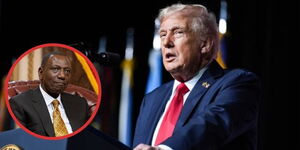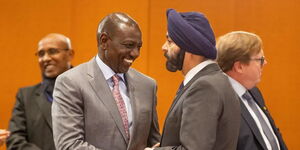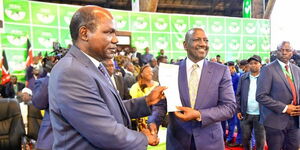The Kenyan consumer's cost of living is set to rise after President Uhuru Kenyatta agreed to implement the Sugar Taskforce recommendations in its entirety.
Speaking from State House Nairobi on February 24, the president formally received the report generated by the taskforce that was set up on November 8, 2018, in a bid to revive the ailing sugar sector.
Uhuru promised to implement all the proposals contained in the report, key among them being the re-introduction of the sugar levy.
“As leaders, ours is to ensure farmers get maximum returns from their sweat,” the president stated.
While the levy is set to go a long way in resuscitating the ailing sugar industry whose troubles reached a climax after Mumias Sugar was placed under receivership, it will be passed on to the consumers, which translates to an increased cost of living.
The former National Treasury Cabinet Secretary, Henry Rotich, had scrapped the levy during the 2016/17 financial year, kicking off an uproar among cane farmers in the sugar belt region.
The levy was charged at 4% of the ex-factory price on all sugar sales and was collected by the Kenya Revenue Authority on behalf of the authority.
However, on November 2, 2019, Kanduyi MP Wafula Wamunyinyi, tabled the Sugar Bill, 2019 which seeks to empower the Cabinet Secretary in charge of Agriculture, in consultation with a newly created sugar board, to impose Sugar Development Levy on domestic and imported sugar to be used for development and promotion of the industry.
President Uhuru lauded the efforts taken by the taskforce, insisting that the levy would be charged on consumers so as to raise the revenue needed to assist farmers to develop their sugarcane crop.
Other proposed reforms include the gazettement of the sugar sector regulations including import rules, amendment of the AFA Act and Crops Act in line with the 2010 Constitution, and a review of the taxation regime in the sector to enhance investor incentives.
The new report presented to the president by Agriculture CS Peter Munya and Kakamega Governor, Wycliffe Oparanya (co-chairs of the taskforce) also proposed the privatisation of public sugar mills, adding that this would greatly boost efficiency in production.
Uhuru and his deputy William Ruto both agreed to create an environment in which the private sector could thrive by investing in the sugar industry.
“The private sector will do business while ours is to support farmers' interests. Let us look for more innovative ways to achieve this as long as it is done in a transparent manner,” Uhuru stated.
Others present at the meeting were Ukur Yattani (National Treasury) as well as Governors Anyang Nyong’o (Kisumu) and Wycliffe Wangamati (Bungoma).












